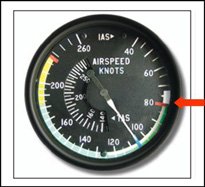Stop Stall-ing
When pilots make a bad landing they don’t blame their bankers. So why do bankers, hacks, and Capitol Hill flaks use a beloved aviation term to malign the national economy?
When pilots make a bad landing they don’t blame their bankers. Or dig up references from their freshman year economic term papers. So why do bankers, hacks, and Capitol Hill flaks use a beloved aviation term to malign the national economy?
“The world is close to stall speed,” wrote one analyst, whose hyperbole was inevitable after economists from Beijing to Sydney started using the metaphor. “Rhode Island’s economy is now perilously close to stall speed,” frets Leonard Lardaro, professor of economics at the University of Rhode Island.
Over at Minyanville, a site for edgy financial commentary, writer Satyajit Das at least fleshed out the metaphor. “Powered flight requires air to flow smoothly over the wing at a certain speed. Erratic or slow air flow can cause a plane to stall,” wrote Das. “Most modern aircraft are fitted with a ‘stick shaker’ that rapidly and noisily vibrates the control yoke or ‘stick’ of an aircraft to warn the pilot of an imminent stall. The global economy, too, needs air flow — smooth, steady and strong growth. Unfortunately, the global economy’s stick shaker is vibrating violently.”
It’s not clear how long economy writers have laid claim to the metaphor, or who coined it first. But it went full throttle in April after its use in block letters atop a numbing, 62-page white paper by the Federal Reserve Board of Governors, Forecasting Recessions Using Stall Speeds.
Not only is the phrase overused lately, it was an imperfect metaphor from the outset. If we’ve got to tap the airman’s dictionary at all, why not minimum controllable airspeed?
The FAA’s Airplane Flying Handbook defines MCA as “a speed at which any further increase in angle of attack or load factor, or reduction in power, will cause an immediate stall.”
For the more poetic writers, MCA makes a sound that’s simultaneously terrifying and irritating. When an airplane changes its angle of attack in such a way that a stall is imminent, a “stall warning horn” positioned on the leading edge of a wing issues a haunting, grating moan. Not unlike the shrill clarion of financial pages themselves.
And you don’t need a rocket scientist to tell you what’s next. Already this summer, Bloomberg News compared the U.S. economy to a rocket ship:“If it has enough thrust it can escape the tug of economic gravity. Not enough, and it just might go into a tailspin.”
Just like our patience.

